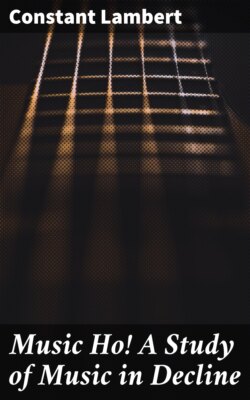Music Ho! A Study of Music in Decline

Реклама. ООО «ЛитРес», ИНН: 7719571260.
Оглавление
Constant Lambert. Music Ho! A Study of Music in Decline
Music Ho! A Study of Music in Decline
Table of Contents
Preface
*
*
Part I
Pre-War Pioneers
*
Pre-War Pioneers
(a) The Revolutionary Situation
*
(b) Impressionism and Disruption
(c) Debussy as Key-figure
(d) Music and the Naughty 'Nineties
Part II
Post-War Pasticheurs
**
Post-War Pasticheurs
(a) The Age of Pastiche
*
(b) Diaghileff and Stravinsky as Time Travellers
(c) Surrealism and Neo-Classicism
(d) 'Toute réaction est vraie'
(e) Synthetic Melody
(f) Abstraction in Music
(g) Erik Satie and his Musique d'ameublement
Part III
Nationalism and the Exotic
***
Nationalism and the Exotic (a) Nationalism and Democracy
(b) The Russian Nationalists
(c) The Conflict between Nationalism and Form
(d) Nationalism and the Modern Scene
(e) The Cult of the Exotic
(f) Exoticism and 'Low Life'
(g) The Spirit of Jazz
(h) Symphonic Jazz
Part IV
The Mechanical Stimulus
****
The Mechanical Stimulus
(a) The Appalling Popularity of Music
(b) Mechanical Romanticism
(c) Craft for Craft's Sake
(d) Mechanical Music and the Cinema
(e) The Disappearing Middlebrow
Part V
Escape or Submission
*****
Escape or Submission
(a) A Psychological Cul-de-sac
(b) Schönberg and Official Revolution
(c) Sibelius and the Integration of Form
(d) The Symphonic Problem
(e) Sibelius and the Music of the Future
Footnote
Index
Отрывок из книги
Constant Lambert
Published by Good Press, 2021
.....
Whether rhythm or metre divorced from the other elements in music can be said to have any musical value is a problem older than the present century. It is discussed with great good sense by Roger North in his Musicall Gramarian (Circa 1728) and his passage on the subject is so much to the point—even more so in our own days than when it was written—that it is worth quoting in full:
'Therefore in order to find a criterium of Good musick wee must (as I sayd) look into nature it Self, and ye truth of things. Musick hath 2 ends, first to pleas the sence, & that is done by the pure Dulcor of Harmony, which is found chiefly in ye elder musick, of wch much hath bin sayd, & more is to come, & secondly to move ye affections or excite passion. And that is done by measures of time joyned with the former. And it must be granted that pure Impuls artificially acted, and continued, hath Great power to excite men to act, but not to think. And this distinction resolves the enigma of Vossius de viribus Rithmi; wch pretends that the efficacy of musick is derived wholly from the measure. Sounds may have effect as symptomes of passion; but wch way he can by any possibility make out, that any pure measure Inclines to thinking, and without thinking there is no passion or affection, I cannot fathom, he instances In ye beats of a Drum, and also the Cooper at work as In the rediculer with his phrigian or Lydian dubbs. Nay condiscends to make a man comb'd Into a passion by ye barbers Lyricks upon his nodle. And it is true enough that the force of such violent Impulses, may excite actions, If any may be conformable. As in ye musick of dances the time is chiefly materiall, and who doth not keep active time to a jigg? The melody is only to add to the diversion, but (as hath bin noted) is not necessary to ye porpose, for many nations dannce onely to a tambour. Therefore I must sever the vertue of time in musick, from the musick itself, as having another scope and effect. And may be sayd to stir up comformable actions but not to excite thinking or pleas the sense.'
.....